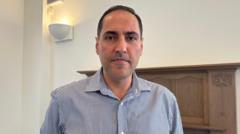Is This Doctor's Wait for News from Family in Gaza a Heartbreaking Reality?

Understanding the Humanitarian Crisis in Gaza: A Personal Perspective
In recent months, the world has been forced to confront the devastating humanitarian crisis unfolding in Gaza. The ongoing conflict has left countless families in dire situations, struggling for basic necessities like food, water, and medical supplies. Dr. Ahmed Sabra, a cardiologist residing in Swansea, shares a deeply personal account of his family's struggles in the war-torn territory, illustrating the emotional toll and the harsh realities faced by those caught in the conflict. This article delves into the complexities of the humanitarian crisis in Gaza through Dr. Sabra's experiences and insights.
The Impact of War on Families
Dr. Sabra has not been able to communicate with his elderly father and sister in Gaza for almost two weeks. The distance and the conflict have created a sense of helplessness for him. He expressed his emotional turmoil, particularly as he hears about the struggles his family faces, including a lack of essential medicine for his niece who has type 1 diabetes. This situation is reflective of the broader challenges many families are enduring in Gaza.
The United Nations has reported alarming evidence of famine and widespread starvation in Gaza, attributing the crisis largely to the blockade imposed by Israel, which controls the entry of essential supplies. This blockade has exacerbated the suffering of civilians who are already facing a dire humanitarian situation.
A Personal Account of Suffering
Dr. Sabra's father, at 75 years old, is among the many elderly residents in Gaza struggling to survive. In a moving conversation, his father revealed the gravity of their situation, stating, “It is very difficult, and there isn't enough food.” Dr. Sabra shared that his father has lost a significant amount of weight since the onset of the conflict, a distressing fact for a physician to bear when he feels powerless to help.
Communication with his family is fraught with challenges, as the internet connection frequently fails, leaving Dr. Sabra in a state of uncertainty. He described the overwhelming feeling of helplessness when blackouts occur, cutting off contact entirely. “You don’t know anything,” he lamented, emphasizing the emotional strain of waiting for news in such dire circumstances.
Struggles for Basic Necessities
Families in Gaza are facing unimaginable hardships, particularly in accessing basic necessities. Dr. Sabra's sister, who has 12-year-old twins, revealed that one of her daughters was struggling to get insulin, with the only supply available being expired. In a desperate attempt to stabilize her daughter's blood sugar, she had to run through the streets pleading for sugar from neighbors. Such scenarios highlight the desperate measures families are forced to take to survive.
Dr. Sabra recounted his sister’s statement that the agony of watching one’s children starve is far worse than the fear of bombings. The skyrocketing prices of basic food items, such as flour, illustrate the economic devastation in Gaza, where a kilo of flour has become 200 times more expensive than it was a year ago. This inflation reflects the dire conditions and the deepening crisis faced by families trying to make ends meet.
The Broader Context of the Crisis
The international community has struggled to respond effectively to the humanitarian disaster in Gaza. Reports from the UN indicate that malnutrition-related deaths are on the rise, with at least 63 documented in July alone. The Israeli government has acknowledged the difficult situation but has denied accusations that they are deliberately starving the population, placing the blame instead on Hamas’s actions.
Dr. Sabra’s experiences serve as a microcosm of the broader suffering in Gaza. Having fled the territory shortly after the onset of the conflict, he faced his own challenges. His family’s home was bombed, and he was initially prevented from leaving Gaza due to bureaucratic issues. The emotional toll of hearing about friends and family members suffering and dying without closure adds to the psychological burden he carries.
Living with Constant Uncertainty
The uncertainty surrounding the fate of loved ones weighs heavily on Dr. Sabra. He expressed the fear that every time he checks his phone, he might receive devastating news about another family member. “I feel guilty when we eat something,” he said, highlighting the stark contrast between his life in Swansea and the struggles faced by his family in Gaza.
This emotional dissonance is compounded by the ongoing violence and instability in the region. The deaths of countless individuals, including extended family members, are compounded by the lack of information about their fate. “Your loved ones sometimes will be killed, and you don’t even know if they’ve been killed or not. They will just vanish,” he stated, capturing the essence of the emotional turmoil faced by families in conflict zones.
Humanitarian Aid and Its Challenges
Efforts to provide humanitarian aid in Gaza are often met with significant challenges. Despite claims from the Israeli government that there are no restrictions on aid deliveries, reports from Gaza suggest otherwise. Dr. Sabra referred to aid centers as “death traps,” highlighting the dangers faced by those seeking assistance. The complexities of delivering aid in such a volatile environment further complicate the humanitarian response.
The situation calls for urgent international attention and intervention. Humanitarian organizations are working tirelessly to provide assistance, but the obstacles they face create significant barriers to reaching those in need. The ongoing conflict not only affects immediate survival but has long-term implications for the health and well-being of future generations.
Reflecting on the Personal and Collective Trauma
The personal narrative of Dr. Sabra sheds light on the broader humanitarian crisis in Gaza. The emotional and psychological impacts of war extend beyond the battlefield, affecting families and communities for generations. The stories of suffering and resilience are intertwined, as individuals navigate the complexities of survival amid conflict.
As the world watches, the plight of families like Dr. Sabra’s serves as a reminder of the urgent need for compassion and action. The humanitarian crisis in Gaza is not just a political issue; it is a deeply human one, calling for empathy and understanding from the global community.
FAQs
What is the current humanitarian situation in Gaza?
The humanitarian situation in Gaza is critical, with widespread famine, malnutrition, and lack of basic necessities such as clean water and medical supplies. The ongoing conflict has exacerbated these issues, leading to a severe crisis for civilians.
How has the blockade affected the people of Gaza?
The blockade imposed by Israel has significantly restricted access to essential supplies, leading to skyrocketing prices for basic goods and creating an environment of scarcity and desperation among the population.
What are the main challenges faced by humanitarian organizations in Gaza?
Humanitarian organizations face several challenges in Gaza, including restrictions on movement, safety concerns for aid workers, and difficulties in delivering supplies amidst ongoing violence and instability.
How can the international community help address the crisis in Gaza?
The international community can help by increasing humanitarian aid, advocating for the protection of civilians, and working towards a peaceful resolution to the conflict that prioritizes the rights and needs of the people in Gaza.
The ongoing situation in Gaza calls for urgent action and awareness. As we reflect on the experiences of individuals like Dr. Sabra and countless others, we must ask ourselves: How can we contribute to alleviating the suffering of those caught in conflict? #GazaCrisis #HumanRights #CompassionInAction
Published: 2025-08-06 22:05:09 | Category: wales


